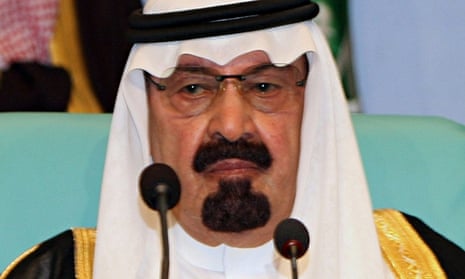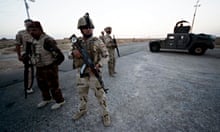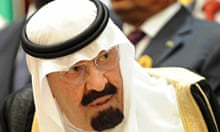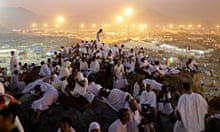Saudi Arabia is on alert for jihadi attacks after a general and two other soldiers were killed by a suicide bomber in the first deadly assault along the country’s border with Iraq since it joined the US-led coalition fighting Islamic State.
The interior ministry in Riyadh blamed “terrorist elements” for the incident early , but did not name any group, though it is thought likely to be Isis, which controls large areas of Iraq as well as Syria.
The ministry said in a statement that a border patrol at al-Suwaif, near the city of Arar, was fired on. Border guards returned fire and killed two of four attackers. But during attempts to persuade another two to surrender, one detonated an explosive belt and killed himself and three of the border guards – one of whom was the commander of northern border forces, General Oudah al-Belawi.
The ministry said Saudi security forces were “determined to thwart … plots to undermine the security and stability of the homeland”. It referred to the attackers as Kharijites, a derogatory term for apostates.
The attack came amid uncertainty in Riyadh over news that King Abdullah, who is thought to be 91, has been in hospital with pneumonia. The next in line to the throne, Crown Prince Salman bin Abdulaziz Al Saud, is in his late 70s and also said to be in poor health.
On Sunday, an Iraqi spokesman said Iraqi forces had driven off an Isis attack on a police post near the Saudi border. It was unclear if the two incidents were linked.
Saudi Arabia is one of five Arab partners in the US-led coalition fighting Isis and has been singled out for attacks by the Isis leader, Abu Bakr al-Baghdadi. The country boosted security on its 500-mile border with Iraq in July, deploying thousands of troops to back up border guards after the jihadis captured Mosul, seized swaths of territory including Anbar province, and announced a caliphate straddling the border with Syria.
In November, fears of a jihadi “blowback” were fanned by a sectarian attack at al-Ahsa, in the kingdom’s eastern province, which killed five people on the Shia religious holiday of Ashura. Fifteen people, all Saudi nationals, were arrested.
Saudi Arabia has been widely blamed for the rise of Isis by funding Islamist groups fighting to overthrow Syria’s president, Bashar al-Assad, while several thousand of its nationals have fought in Syria and Iraq, many encouraged by extremist clerics. In recent months, however, it has imposed stricter controls and criminalised fighting abroad while announcing scores of arrests. It flatly rejects accusations that it supports terrorism.
Salman offered assurances at a cabinet meeting on Monday about the health of the king, the state news agency SPA said. The royal court said last week that the king had pneumonia and temporarily needed a breathing aid. A medical procedure had been successful and his condition was now stable, it said.




